blog
We don’t believe in waste of any kind, not just resources, but also time, energy, ideas or money. Life is short; we don’t want to waste it. Here you can delve deeper into the work with do with our customers by reading our binit blogs.
We don’t believe in waste of any kind, not just resources, but also time, energy, ideas or money. Life is short; we don’t want to waste it. Here you can delve deeper into the work with do with our customers by reading our binit blogs.
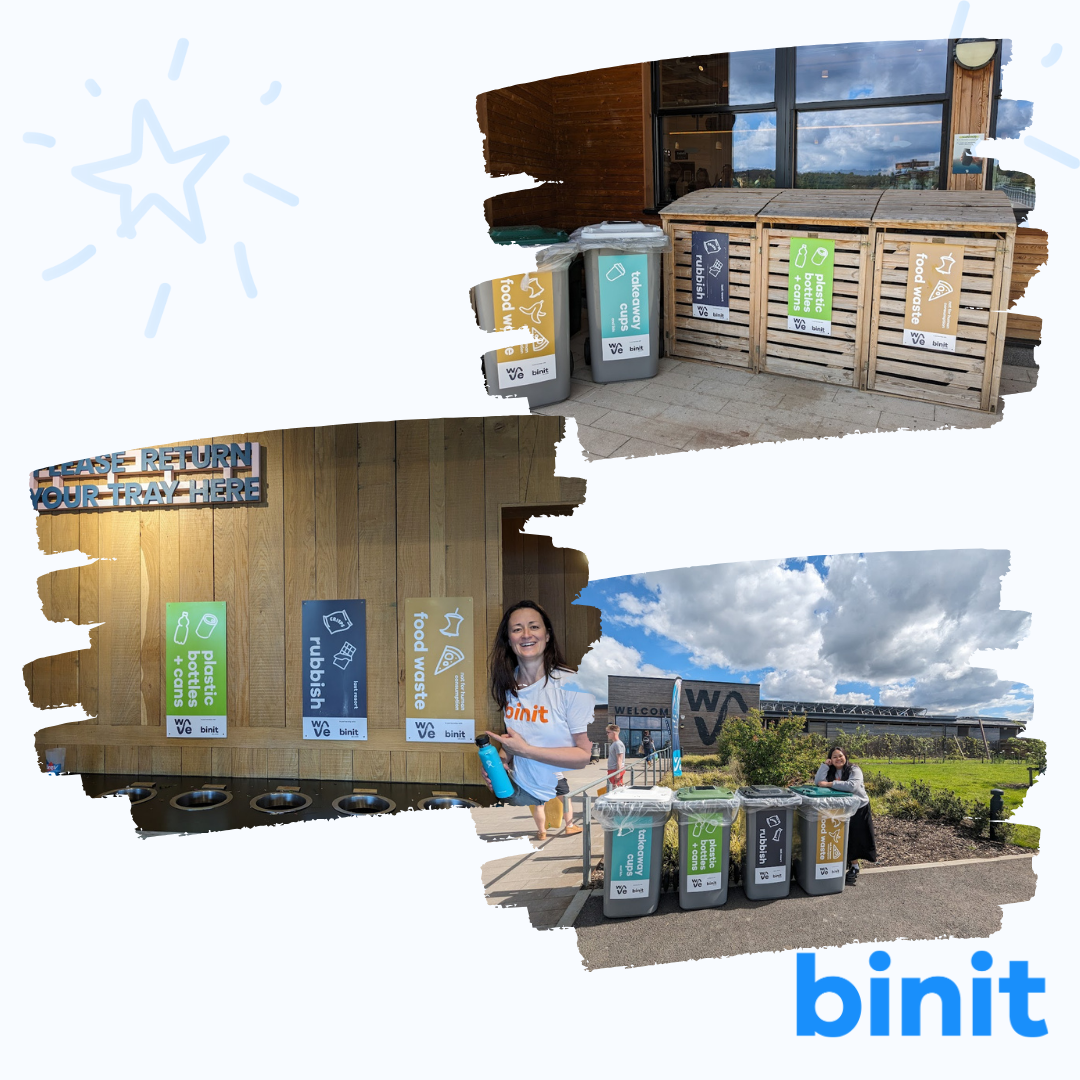
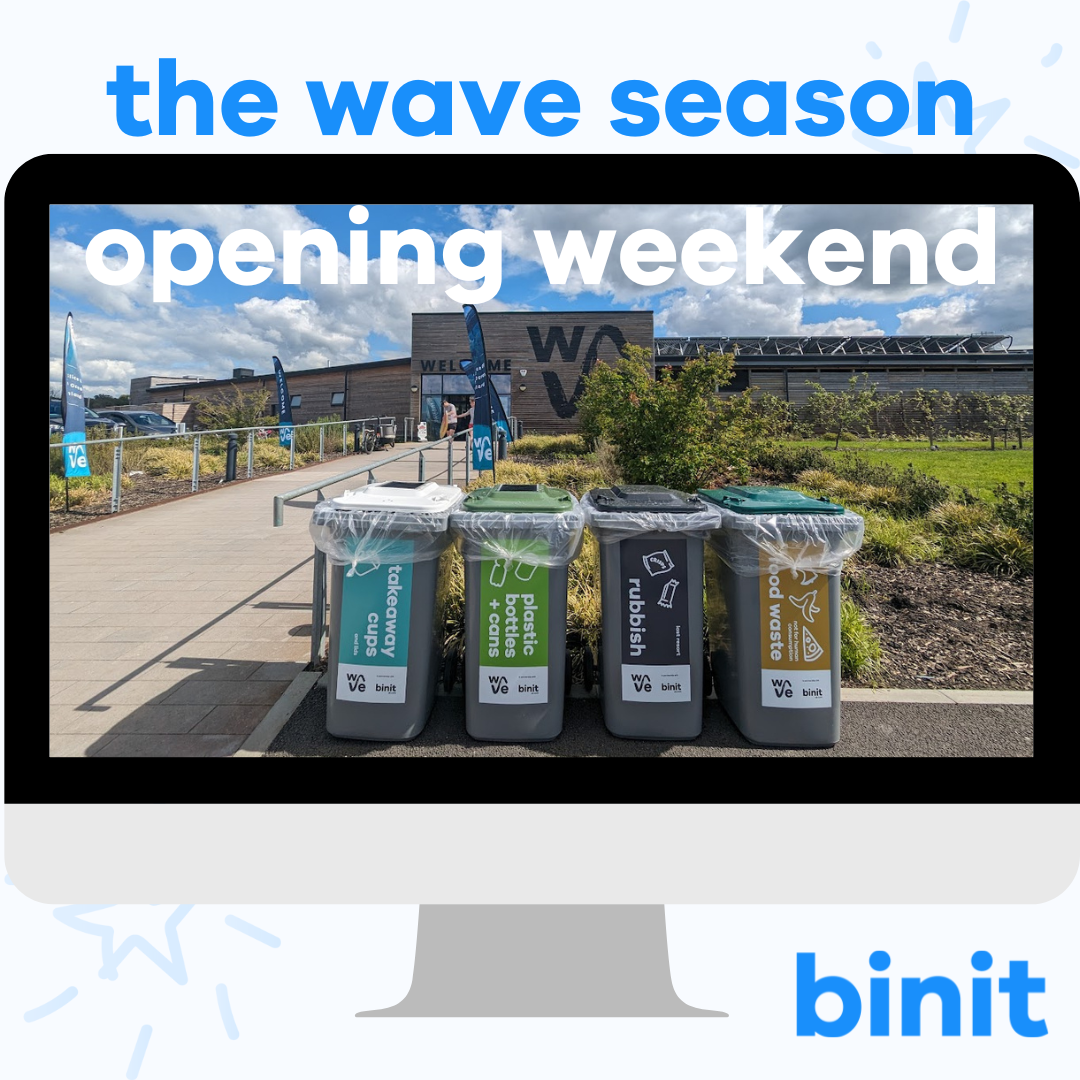


We had the honour of attending The Wave season opening weekend on Saturday. Good weather, great surf, nice bins 😉 What’s not to love?
We have worked with The Wave since 2022. Together, we’ve identified imagery that best work for their staff and customers in terms of direction. For example, crisp packets for the rubbish bin and banana peels and pizza slices on their food bin. We also introduced takeaway cups as an additional waste stream for external use as that was one that we pinpointed that contaminated their regular bins. Having plastic bottles and cans as a separate waste stream also helps customers to better recycle as it is clearly signposted.
Did you know, most of the waste vehicle movements are less than 8 miles from The Wave? For a visual representation, click here.
Keep an eye out for fun family activities launching at The Wave for half-term and make sure to put your waste in the right bins when you go!

Read more about Binit in the 2024 The FSE Group Impact Report! In our most recent funding round led by The FSE Group, we received £500,000 equity from the British Business Bank South West Investment Fund (SWIF), marking the fund’s first major equity deal. Page 8/25
FSE Impact Report 2024 FINAL.pdf (thefsegroup.com)

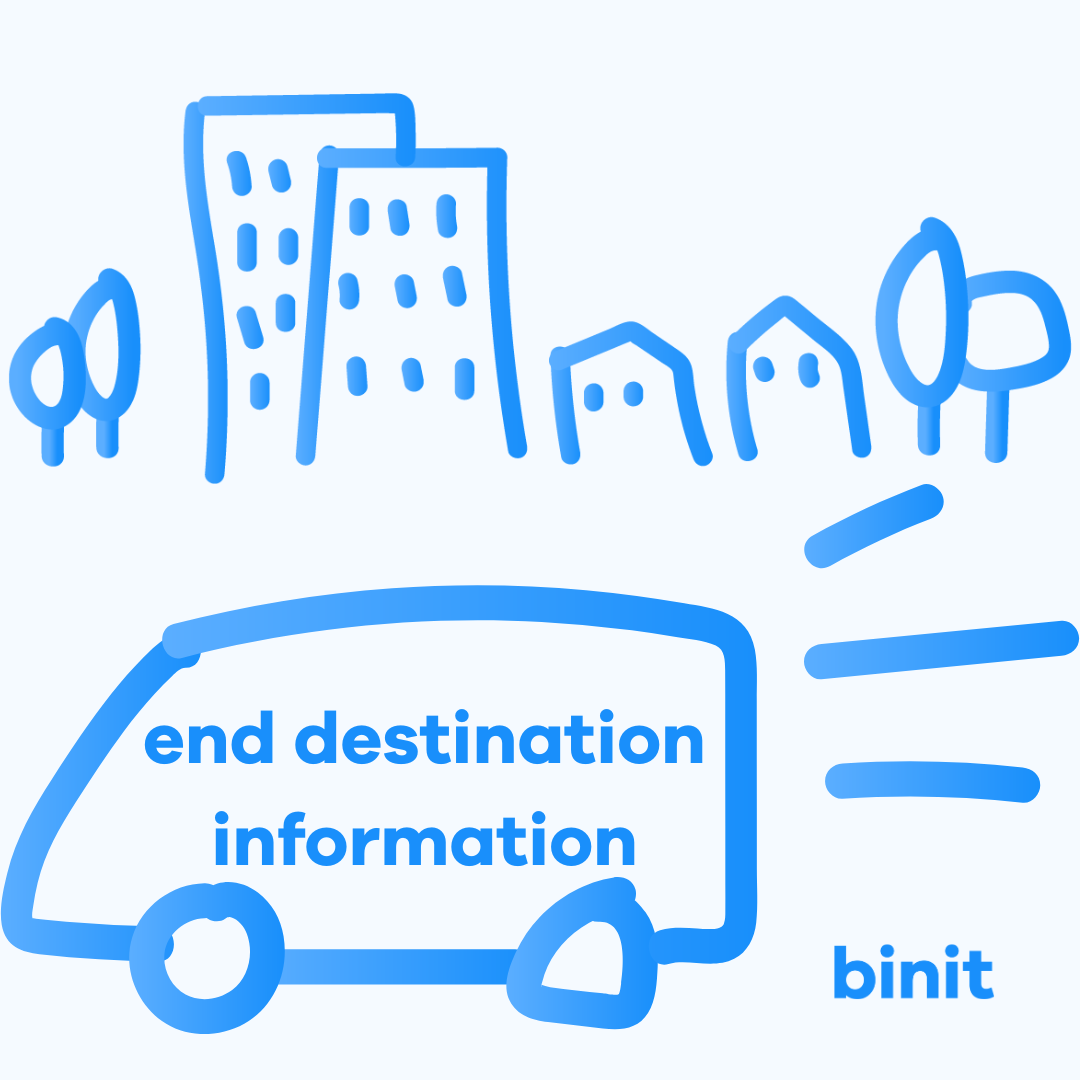
We’ve previously shown you how your small WEEE items and fridges are recycled. Now, let’s go on a deep dive on how your mixed recycling gets processed!
Your mixed recycling goes on quite the journey. Today we’re going to tell you about how the materials get separated and sorted. Once collected from your site, your mixed recycling is sent to a Materials Reclamation Facility (MRF). There are many variants of the “R“ in MRF, some have it for recovery, some have it for re-use, some have it for recycling. You get the gist!
First Stop – Tipping Point: The mixed recycling is tipped on the tipping floor and then scooped up on to the conveyor belts.
Second Stop – Inspection: The conveyor belt first passes through the pre-sorting area. Here, MRF workers manually sort your items! They work diligently to identify potential hazards, such as lithium batteries and non-recyclable items such as banana peels. These items are then separated and removed from the conveyor belts, down designated chutes. These items are then recycled along their respective waste streams. We have a separate blog here on what happens to small WEEE like lithium batteries.
Third Stop – Disk Screen: The remaining materials now go through a disk screen. This process separates out flat and wide materials like cardboard from other materials. The flat materials are then inspected again by the MRF workers to ensure no other materials slipped through.
Fourth Stop- Blower: Paper is blown to the side, separating it from the other materials. This is then inspected again by the MRF workers to ensure no other materials slipped through.
Fifth Stop- Electromagnet: Metal is separated from the remaining materials using an electro magnet. Non-ferrous metals are further separated from the metal collected via eddy current separators. The metals are then recycled along the respective processes for each type.
Sixth Stop – Disk Screen (Again): Plastics are separated here by their polymer types and then baled. Glass (if any, but we DO NOT recommend putting it in your mixed recycling bin) is separated here and sent along to be recycled along its route.
Finally…. Most of the items are baled and many different things happen to them. For example, items like cardboard and paper often are sent to manufacturers that can give a new life to them.
We’ll go into depth soon for other waste streams. Hope you learned something new today! Let us know which waste stream you’d like to learn about next by emailing sara@binituk.com.
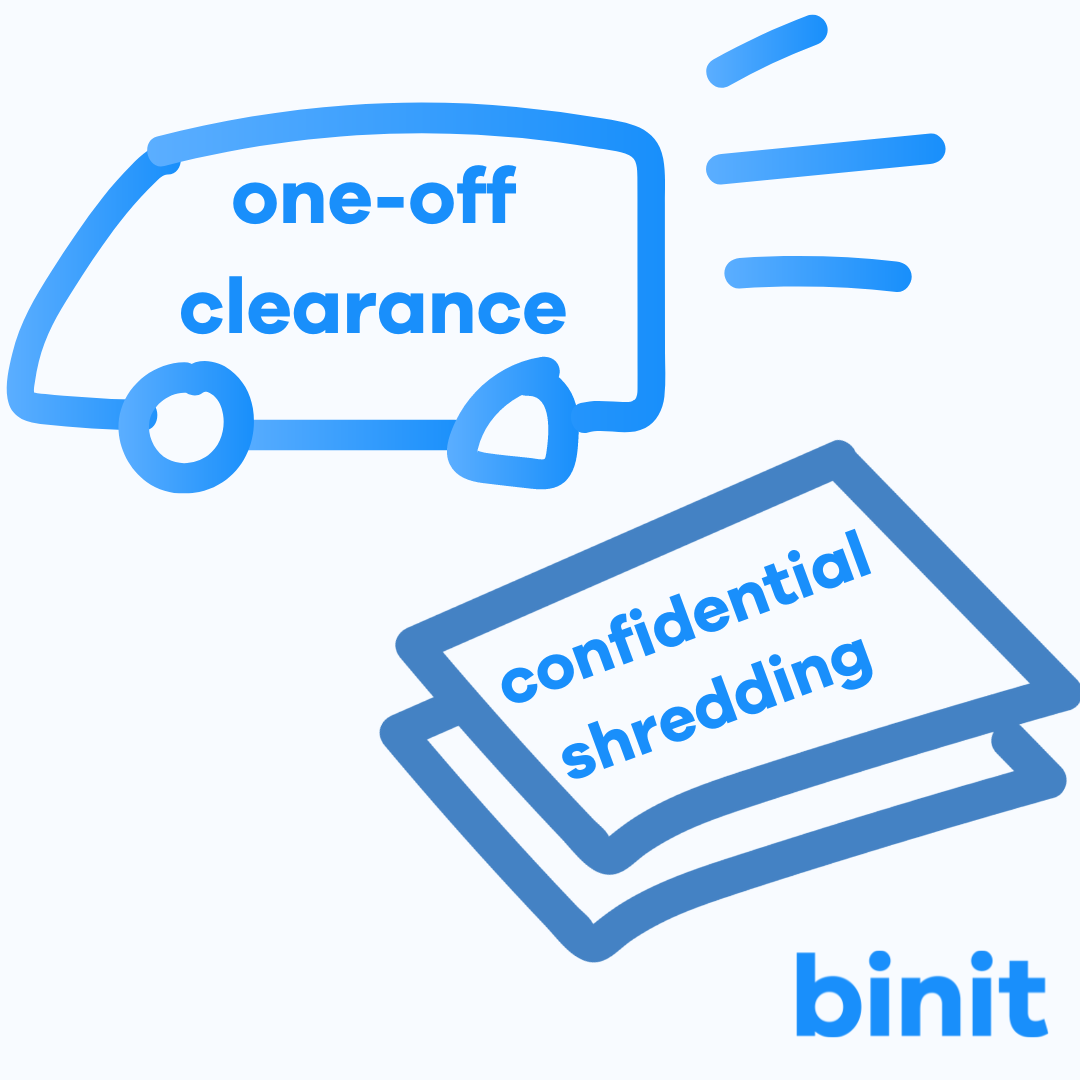
Spring has sprung and a new financial year has begun. It is vital to ensure any sensitive information is safely destructed, don’t just throw out your paperwork! We offer on-site and off-site confidential shredding to aid you to comply with legislation.
Started your spring clean or thinking about it? Been thinking of getting rid of that old desk or chair? We can help you with that too! We offer bespoke one-off clearances to cater to your needs. Get in contact today by ringing 01392 247035 or emailing home@binituk.com

A couple weeks ago, we were awarded Highly Commended in the Micro Business category at The Exeter Sustainability Awards.
Binit started with the aim to get litter of the streets of Exeter, and this wonderful city is our home ground. It is an honour for our efforts to be recognised.
It is great to be surrounded by a community of like-minded businesses and moving forward we are sure there are big impacts that will be made to Exeter and beyond by this community!
The event was catered by one of our lovely customers Bel’s Kitchen. Cecilia Manosa Nyblon who spoke at our previous Big Binit Breakfast, delivered an inisightful presentation on her work for COP28 We Are the Possible.
Photo credits: Exeter Sustainability Awards




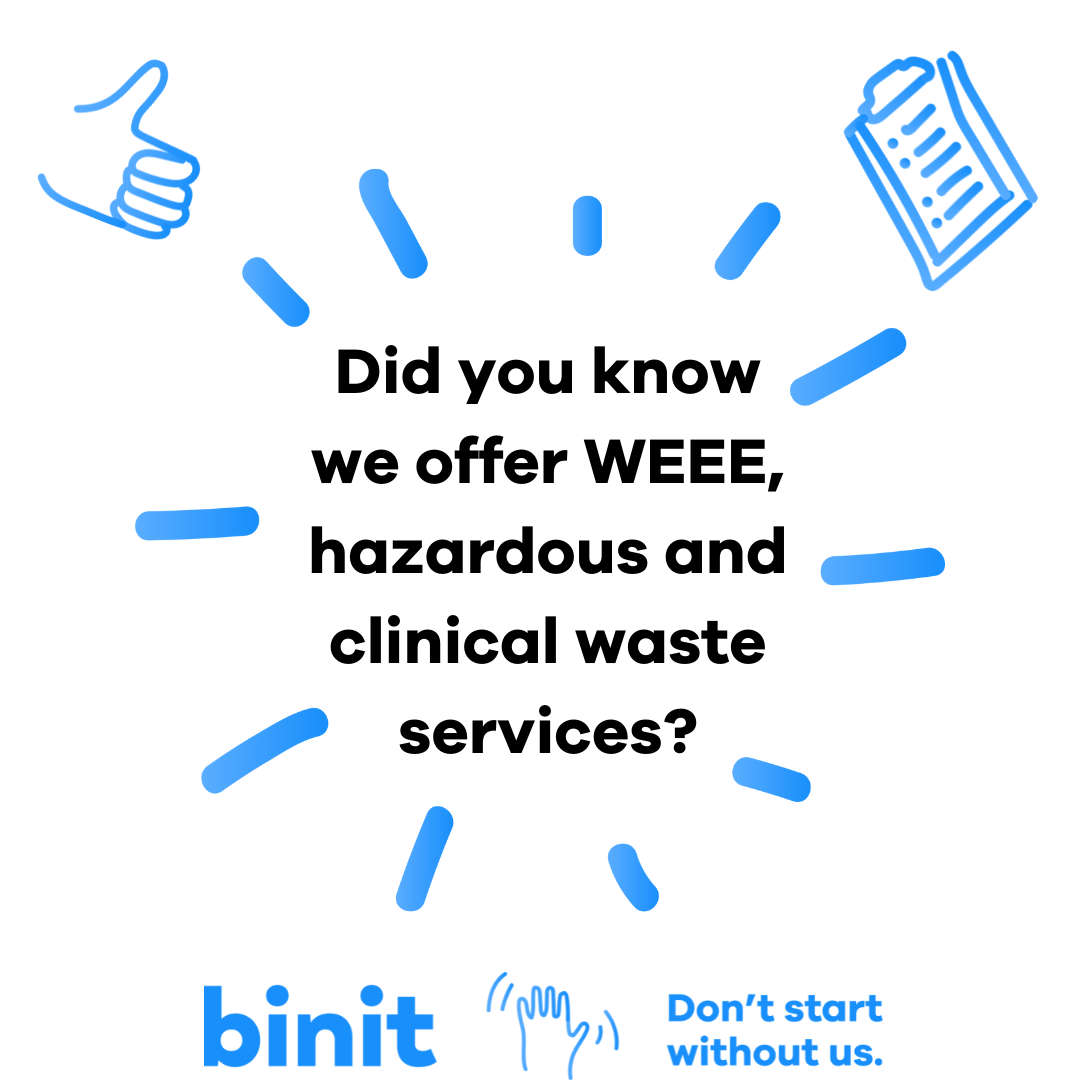

This is a reminder that from 6 April 2024, it will become law for all businesses, charities and public sector organisations in Wales to segregate their waste for recycling.
To comply with this you will need to separate:
1. Food
2. Paper and card
3. Glass
4. Metal, plastic and cartons
5. Unsold textiles
6. Unsold small waste electrical and electronic equipment (sWEEE)
If you’d like to get ahead the legislation in England and Scotland, get in touch today.
Give us a call at 01392 247 035 or email home@binituk.com

Follow your food’s journey this Food Waste Action Week! Have you ever wondered what happens to your food waste after it has been collected? Look no further! #foodwasteactionweek






